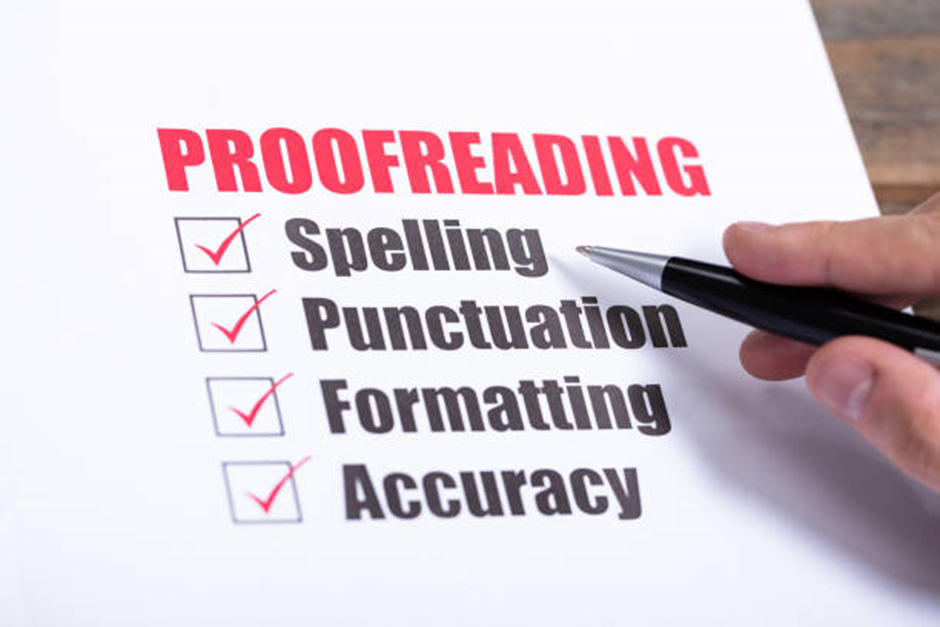Introduction to Online Proofreading Jobs for Beginners
In today’s world, almost everything we do is online. From shopping to socializing, earning a living is also possible in the digital space. One of the simplest ways to earn money online is to find online proofreading and writing jobs yourself. However, it’s important to know how much you can earn from it.

What is Proofreading?
Proofreading is a crucial part of any writing process. Legitimate online proofreading business are jobs where one ensures that there are no grammatical errors, spelling mistakes or punctuation errors in written content before it goes live for others to see. As an online proofreader, your job would be to review and identify these errors quickly and efficiently.
Why is It Important?
Proofreading not only corrects spelling and grammatical errors but also improves the flow and readability of the written piece. This may sound like an unnecessary step for some people; however, in professional settings like businesses or publications, poor grammar can reflect poorly on the writer’s (or speaker’s) competence.
How Can Beginners Get Started?
Beginners can start by looking out for freelance websites which offer such jobs and apply after reviewing their requirements. These sites might charge a nominal fee for joining or subscription to ensure quality work submitted every time.

The Skills Needed for Successful Proofreading
Attention to Detail: As a proofreader, you need acute attention to detail, which helps point out any error, whether minor or major.
Grammar and Punctuation Knowledge: An understanding of grammar rules, punctuations etc., are key skills needed. So having basic knowledge of vocabulary must be there.
Time Management: This ties into attention to detail because successful proofreaders must meet deadlines while keeping accuracy at bay. This skill requires focus along with good time management.
Communication Skills: Strong communication skills are essential when relaying client information about potential changes that need reviewing.
Proofreading vs Editing: What’s The Difference?
Definition of Proofreading and Editing: Proofreading and editing are interrelated but different skill sets. Both require a keen eye for errors, but proofreading comes at the end of the writing process, where surface-level mistakes like grammatical errors, punctuation etc., must be spotted. Editing, on the other hand, is more comprehensive, where one can make changes to writing structure and sentence constructions.
Key Differences and Similarities: Since they both share a commonality in a writer’s workflow, there is symblance between both the roles, yet each has its responsibilities designated for different purposes:
– Proofreaders focus mainly on fundamental grammar rules and taking care of small obvious mistakes
– Editors tend towards larger structural issues, with the focus is making sure the content flows properly
Choosing the Right Career Path: It ultimately depends on your skills as an editor or proofreader. Keep in mind that professionals doing this work should possess strong editorial skills—grammar rules knowledge, attention to detail as well experience working with clients to meet deadlines—to deliver quality work.
How To Build Your Proofreading Portfolio
Importance of a Portfolio: Your portfolio may help you get noticed by potential clients online. Having a creative, elegant portfolio — whether it be a simple website showcasing samples or using third-party content sites to demonstrate professional development—is key since most prospective employers consider quality over quantity in this industry.
What To Include: Typical components include samples demonstrating your specialized expertise, such as academic writing versus business reports, and relevant education certifications, if available.
How To Showcase Your Skills Effectively: A detailed list of examples ranging from more complex writings such as dissertations and academic papers down into smaller documents like emails or resumes so potential clients understand all relevant experiences you have when trying to build credibility for yourself.
Top 5 Online Proofreading Courses For Beginners
Course Descriptions And Benefits:
1)The Basic. Proofreading online course offered through The Editorial Freelancers Association offers professional resources and helps to navigate through key concepts.
2) Scribendi, a well-known writing company, offers various pre-recorded training videos categorized for different levels of expertise.
3) Proofread Anywhere, launched by the popular proofreader Caitlin Pyle is a comprehensive coursework packed with detailed information regarding the industry along with advanced techniques to improve online proofreading job skills.
4) Udemy offers courses in varying languages, and you can expect hours’ worth of material on topics ranging from understanding marketing jargon to making sure sentences flow smoothly.
5) Grammarly (which should probably be used regardless of professional status anyway) offers Grammar Foundations, Intermediate Writing, Advanced Writing and Business Writing taught by seasoned instructors that cover everything from grammar basics to professional writing techniques.
Pricing And Duration:
Price points seem to range from free (if using resources like Grammarly or Udemy, though less likely when going through programs like the EFA’s check out major freelancing websites such as Upwork); proofreading services that have more extensive course materials can charge up to $1k+.
How To Choose The Best Course For You: Look into who provides the course and their background; find reviews from previous students and confirm this platform adheres to standards offered by the International Association of Professional Writers & Editors.

Getting Certified As A Professional Proofreader
The Advantages Of Certification: Becoming certified through an online program may show clients your level of knowledge and professionalism, increasing the likelihood of gaining repeat customers. It also allows you access to some certifications that vet potential members creating basic best standard protocols for those entering the field.
Popular Certification Programs: well-known institutions offering certification programs include: the American Association of Proof Readers; The International Association of Professional Writers & Editors. Both offer reputable curricula along with being run/validated joined associations either for growth purposes or continuing education enhancements.
Steps To Becoming Certified:
1.)Choose a program that fits your goals.
2.) Meet prerequisite requirements
3.)Complete relevant coursework
4.) Prepare for the certification exam
5.) Take the exam and get certified!
Finding Your Niche In The Proofreading Industry
Types Of Content That Need Proofreading: Finding your niche is important since not all types of documents reach out to the same client base; typically, academic papers go hand in hand with research-focused clients. Likewise, resumes align well with job searchers.
Identifying Your Strengths And Interests: know what you’re great at so that you demonstrate it persuasively as part of your pitch, whether it’s proper subject-specific terminology in fields like business or biology, creating sophisticated article flow or even fixing a laundry list of grammatical issues while staying on deadline.
Carving Out A Niche For Yourself: As a freelancer, it’s good to be competent across many genres but make sure you also have outstanding expertise in one speciality area.
Creating A Professional Website For Your Proofreading Services
Why You Need A Website: Even if you’re listed on other online marketplaces proving professionalized service, having one designated site for prospective employers may highlight paid candidates featuring relevant certifications, previous work examples etc.
Essential Website Elements:
– Online content Resume
– Testimonials from satisfied clients
– Relevant certifications posted
– Portfolio showcasing diverse samples that show competency across a variety of subjects and projects
Tips For Effective Website Design:
1) Go basic. Don’t overwork site design with too much flash
2) Doublecheck spelling and grammar throughout the website design
3) Avoid contracting freestyling design that isn’t geared towards highlighting proofing services – not all freelancers excel at website creation (if none are available, hit up sites like wix.com etc.)
4) Lastly, make sure contact information is up-to-date and published on multiple locations throughout the site
Marketing Your Proofreading Services
Marketing is crucial when starting in the world of freelance and home proofreading jobs. Without proper marketing skills or strategies, no potential clients will know about your services. Below are some tips on how to get best proofreading jobs started.
Social media marketing
Social media platforms such as LinkedIn and Twitter can help expand your reach. By creating profiles on these platforms highlighting strengths and experience in your own proofreading business, it becomes easier for potential clients to discover you online.
Networking with other professionals
Attending seminars or conferences related to the writing or publishing industries can open up opportunities for networking with other industry professionals who may require proofreading or editing services occasionally.
Freelance job listings and platforms
Websites like Fiverr allow beginners with little experience in proofreading to make money and take on projects that match their expertise level while still earning some income.
Top 10 Websites To Find Proofreading Jobs For Beginners
These websites offer flexible schedules for beginners who wish to earn extra income from the comfort of their homes.
Upwork: This website offers both recurring projects (which allows freelancers to find more stability) and shorter projects (for beginners).
Freelancer – This platform allows both full- and part-time jobs for proofreaders.

Fiverr: Part-time remote proofreading jobs suitable for beginners on a tight schedule and those with little or no experience in finding online proofreading jobs.

Scribendi: This platform only takes on professional freelancers who demonstrate good communication skills, punctuality, and attention to detail.

Polished Paper: This website offers flexible schedules language editing assignment with varying rates based on editing or proofreading experience.

Gramlee: This online editing other proofreaders service recruits freelance book editors, proofreaders, and copy editors to work from home.

ProofreadingServices.com – Proofreader services offer remote or home-based part-time proofreading jobs and online jobs that require attention to detail and a desire for problem-solving assignments.

Wordy – Accepts applicants from across the globe. Wordy requires meticulousness when it comes to proofreading English documents from clients all over the world.

EditFast – Registrations are open worldwide for native English speakers interested in freelancing through EditFast’s client base
Scribe Writing Agency: Offers various writing services, including editing and marketing strategies, and connects writers globally.
Setting Your Rates as a Beginner Proofreader
One thing every beginner needs to note is setting reasonable rates when starting out offering their services. There are a few factors to consider when determining rates:
Factors to consider when setting rates:
Experience: For an individual lacking previous knowledge of the process will take longer, therefore, charging less compared to an experienced professional who can produce quality error-less documents in less time and can charge accordingly.
Complexity: Some documents/events may entail higher pricing depending on their intricate details. A more complicated piece could require more time because it might have obscure technical jargon that not everyone knows. Thus charging more is reasonable here (which applies regardless of expertise level).
Comparing your rates with industry standards:
By researching extensively about competitors within the industry, you gather information about what your competition charges their clients per word. From there, you evaluate your price range considering time investment and the client’s goodwill.
How to negotiate rates with clients:
Managing one’s expectations is key. Remember to be honest about how much work goes into proofreading can help set an expectation for what type of pricing your work deserves. It is ok to pass on a project or renegotiate costs in scenarios where you feel the client may exploit a given scenario.

Handling Client Feedback And Revisions
As we all know, clear communication leads to fewer misunderstandings which would mean less back-and-forth over revisions giving rise to more productive work:
Importance of clear communication:
This must be emphasized more as it streamlines proofing processes during initial assignments because both parties understand their requirements before setting off in different directions. Clarity eliminates any chance of disappointment, thus guaranteeing repeat customers and better testimonials for future business prospects.
Managing expectations:
The biggest step involves gathering info from your clients regarding expectations, thereby communicating clearly the timeframe, automation tools, and necessary steps one will follow during the project lifecycle.
How to handle negative feedback:
Negative feedback should not discourage a beginner but, instead, give room for improvement. Please take advantage of such moments by learning from constructive criticism rather than taking it personally.
The Pros And Cons Of Freelance vs In-House Proofreading
Some benefits and drawbacks come with working either find freelance proofreading jobs or in-house job settings when providing freelance proofreading jobs and services.
Comparing Both Work Environments :
Freelance jobs are related to consistency, where you need not worry about fixed hours, so more flexibility, while in-house professionals have stable wages but may entail rigid schedules.
Benefits and Drawbacks Of Each :
Freelance professionals enjoy lenient schedules, thus the possibility for more significant income compared to office-based colleagues who might deviate from their working schedule without being detected by colleagues or bosses. Freelancing means greater flexibility in scheduling due dates; however, working at home might make one susceptible to distractions leading to difficulties completing assignments on time.
Choosing The Best Fit For Your Lifestyle
Which work environment suits your lifestyle, budget, and stress management goals? Understanding what kind of life you aim to build for yourself will help determine which route to follow.

Balancing Work And Personal Life As A Proofreader
One of the biggest challenges in a freelance proofreading career or job involves balancing work and personal life. Below are some tips on balancing work-life properly:
Time management: Dividing each day based on available hours and, most important, tasks can increase productivity levels, ensuring the timely delivery of projects.
Setting boundaries: Having a designated workspace with minimal interference from family members or roommates ensures complete concentration while working.
Avoiding burnout: Engaging in work-related activities, such as pursuing hobbies/interests, maintains mental health preventing exhaustion.
Staying Updated On Industry Trends And Best Practices
Continuous learning is crucial to stay up-to-date with industry trends and promoting one’s stable standing within any work environment. Utilizing the following resources guarantees one keeps up with their game beyond peer expectations:
Importance of continuous learning: It provides an edge hence safeguarding employment while opening avenues that set professionals apart from others in their field.
Resources for staying informed: Reading books, joining professional communities online or attending conferences adds value as it allows sharing ideas and identifying upcoming opportunities that could otherwise slip through handheld devices without one knowing it.
Networking with other freelance proofreaders: Making friends online in this field creates access to top professionals who provide insights into new ventures aiding the freelance proofreader spirit growth.
Building a Long-Term Career In Proofreading
Advancing your skills: Knowledge acquisition might go beyond website-based courses offered by many institutions, but relevant training offering highly specialized certifications guarantee long-term career prospects.
Expanding your client base: Building strong business relationships and expanding clientele requires providing excellent services, trustworthy referrals, and building brand influence generating automatic web traffic from potential clients globally looking for someone of your calibre.
Diversifying your income streams: Stretching your ability to work in different domains, such as web content editing, social media content management, and academic writing helps expand income streams hence creating a stable stream of income capable of managing everyday living expenses.
The Role of Technology in Proofreading
As with many industries today, technology plays a significant role in proofreading. A variety of software programs and tools are available to assist with the process of identifying errors such as spelling mistakes or incorrect verb tense usage.
Proofreading Software and Tools
Several software programs can help speed up your workflow while ensuring accuracy:
Grammarly: A comprehensive writing assistant that checks spelling, punctuation, grammar, sentence structure, and style.
Hemingway – An app designed to simplify your writing by highlighting complex sentences or phrases that could be clearer.
ProWritingAid – Provides real-time Grammar checking while combining various features like context-based suggestions to deliver accurate corrections.
Benefits and Limitations of Technology
Although these tools can be incredibly helpful in catching mistakes quickly- they’re not foolproof. For example, they won’t pick up nuances specific to different languages or obscure vocabulary; therefore, it’s important also to have human expertise when using them. Additionally- automated programs won’t necessarily recognize errors stemming from contextual ambiguity or poor writing flow- which only human experience can recognize satisfactorily.
Balancing Human Expertise with Automation
Ultimately each proofreader will need to determine which combination of technology and experience works best for their work needs. Good quality base-level checks using software combined with higher-level skills like advanced grammar mechanics will provide an advantage over others.
Proofreading Opportunities in Academic Writing
Types of Academic Content
The academic writing industry is vast and includes areas like dissertation and freelance proofreading services, research paper editing, and manuscript preparation. These types of services are usually offered by niche service providers such as universities, press offices, or scholarly consultants- presenting a broad range of opportunities from generalist to specialist work.
Challenges and Rewards of Academic Proofreading
Key benefits include working with diverse and intellectually stimulating pieces while feeling pride in contributing towards high-quality academic research. However, some challenges come with this, as the requirements can be more technical than what might be found outside academic circles. This requires strong skills in formatting while also understanding complex statistical data management issues.
Tips for Success
Success comes from paying attention to details! Often, if there is an error at the start, it’s easier for them to creep into other aspects of the papers’ accuracy over time. Additionally, it’s essential to have good communication skills so that you can collaborate effectively with clients on their specific needs.
Exploring Proofreading Jobs in the Publishing Industry
Working with Authors and Publishers
This industry requires creative thinking while ensuring manuscripts meet the required house style styles. It features traditionally published works alongside indie publishers who emphasize speed-to-market releases or self-published content. Regular editing jobs done within these categories include copy-editing virtually any kind of literature, from children’s books to technical manuals across many different levels, from beginner authors to established authors works almost entirely online.
The Role of Proofreaders in Book Production Processes
Their responsibility serves as the last checkpoint before the publication-related marketing phase begins since all errors should have been removed already by this stage; proofreaders focus on catching any missed-up areas. Many publishing teams consult professionals at the end process before launching printed versions or e-books amongst digital resources – similar roles exist for media companies with user-generated content as well.
How to Break Into the Publishing Industry
If you’re looking to start a career in publishing, there are a few things you can do to make yourself more marketable. Firstly look into publishers or author groups and connect with potential clients via social media or writing industry conventions- this way, you’re involved enough in that industry to know what publishers are looking for in terms of qualifications when they’re hiring personnel.
Proofreading for Non-Native English Speakers
Unique Challenges and Opportunities
Non-native speakers working online come with their individualized challenges, such as cultural nuances as well as varying grammar rules beyond standard English grammar. Nevertheless, this presents more opportunities for online proofreaders able to bridge the language gap between those who wish to communicate effectively with legible and polished written communication.
Tips for Working with Non-Native Speakers
When proofreading non-native content, keep it simple while checking clarity since using jargon like idiomatic expressions could be more helpful. Proofreaders should also be very cautious about the changes that need to be made – always bearing in mind whether alterations could result in losing meaning.
Building a Reputation In This Niche
Building up your reputation is a process, but it helps by having positive testimonials from past clients available on your portfolio. It’s noteworthy spreading the word and advertise your services through websites related to education sectors offering courses meant for international students or freelancing platforms dedicated purely to these industries – where many academic projects are available.

Proofreading Legal Documents: A Specialized Niche
Understanding Legal Terminology
This may seem straightforward, but understanding legal wording is key—knowledge of relevant terminology vital if editing legal contracts and documents.
Requirements for Proofreading Legal Documents
Regulations vary based on jurisdiction-albeit within certain basic parameters -qualification requirements emphasize strong familiarity with the laws governing specific territories at a minimum bachelor’s degree or level, ideally a law degree as well as work experience within the legal sector plus knowledge about formatting protocols surrounding large document reviews or e-documentations inspections along actively pursuing certifications necessary.
Finding Jobs in This Niche
Job-seekers can search for work through online networks listing opportunities within legal offices or contacting paralegal services providers. Additionally best online proofreading jobs, networking with other professionals who offer online proofreading jobs and services would be good, along with exploring Any freelance websites specifically focused on law documents. Becoming part of affiliated groups such as copywriters organizations will help job seekers.
Working with Style Guides in Proofreading
Commonly Used Style Guides
APA, Chicago, and AP are a few examples of common style guides that proofreaders use. Digital resources like Grammarly usually have style adaptability making switching easy while your qualifications increase over time as learning many styles gives efficiency benefits similarly.
Adapting to Different Client Preferences
Each publisher organisation or university may prefer distinct styles – it’s paramount for proofreaders always to study guide requests well prior to beginning their work. Refrain from conforming to client preferences could have quick closure, which means you waste time redoing the work. Know your audience!
Tips for Mastering Various Style Guides
Free time must go into reviewing particular annual updates and amendments regarding footnotes and bibliographic entries- this critical information is relevant if law firms submit briefs, win lotteries, or win an award after submitting curriculum vitae s at any academic institution. In-house training sessions (if you’re working full-time) organised where you will learn multiple industries’ applications plus techniques used to generate written products under a range of circumstances, thus growing new skills needed.
Improving Your Proofreading Speed and Efficiency
Techniques for Faster Proofreading
While proofreading test software helps catch mistakes quickly – there’s no substitute for honed manual skills., however even experienced professionals have specific handicaps needing more refining. Therefore, it’s essential first to have familiarity with taking tests, ensuring speed improving practicable Nevertheless, holding practising some speed steps such as reading material aloud is the best way slow pace, correct little pointing marks, follow sentence readability together, simultaneously implement every manual knowledge tricks plus keyboard shortcuts allowing computer navigation proficiency improved too.
Balancing Speed with Accuracy
While speed matters in this field as it enables you to do more work, it’s vital to prioritize the accuracy of your work. You don’t want to sacrifice quality merely because you’re taking a rush job or pressurised due to other ongoing projects.
Setting Goals for Improvement
The journey towards mastery is a continual one, so it’s essential to set specific goals for improvement. Whether it’s increasing your speed or refining your grammar skills, setting actionable goals and tracking progress will help you become a more efficient and effective proofreader.
Overcoming Common Challenges Faced by Beginner Proofreaders
Dealing with Difficult Clients
One common challenge faced by beginner proofreaders is dealing with difficult clients. It’s essential always to communicate effectively while not being defensive – this ensures that the final product meets client satisfaction.
Staying Motivated During Slow Periods
Slow business periods can be discouraging for beginning writers; however, it’s essential to find other ways to stay active in that industry. Internships, guest posts, or even reading samples of other people’s work will keep one updated and improve portfolio quality for future purposes.
Coping with Self-Doubt and Imposter Syndrome
Impostor syndrome tends to take effect far too often; remembering everyone makes mistakes, such; as feeling doubtful, is only natural human nature at times. However, it’s comforting knowing adequate training and experiencing various chances presented helps improve capabilities over time as proofreading takes lots of practice. Positive feedback from happy customers helps remind oneself how necessary one’s career choice is!
Conclusion: Building a Successful Career in Online Proofreading
Recap of Key Points
Online proofreading offers excellent job opportunities, especially growing a freelance proofreading business from remotely where numerous editing styles in all industries exist already! Remember, besides constantly improving skills, efficiency should be equally held important, plus personal branding strategies that attract desirable projects make one visible within respective niche sectors!
Encouragement for Beginners
It might seem complex initially, but following needed educational steps alleviates it, plus finding an understanding support system encouraging keeping pace with the growth these jobs require is vital.
Next Steps for Launching Your Proofreading Career
There are many ways for newcomers to try out online working career moves, particularly exploring job boards or opting to provide services pro bono initially before getting recommendations/endorsements from satisfied clients and graduating to paid work. Joining a professional association or network to learn skillset while sharing experiences with peers, expanding diverse clientele.
